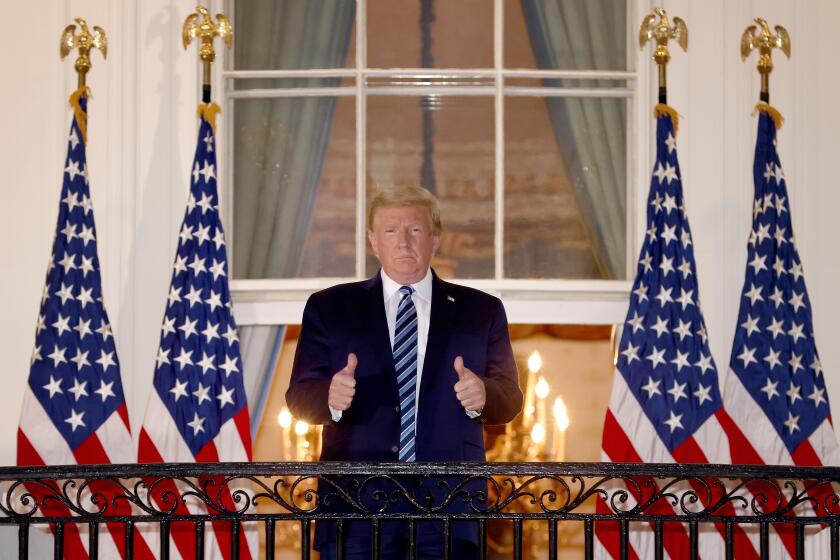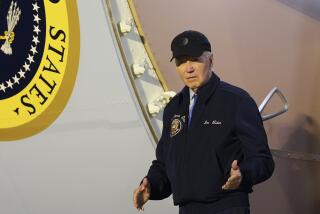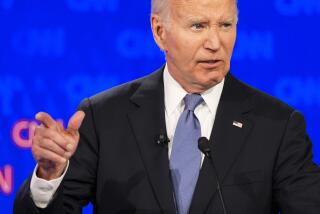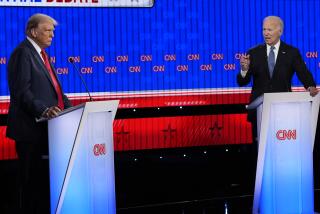Trump must prove he’s no longer contagious before next debate in Miami, Biden team says
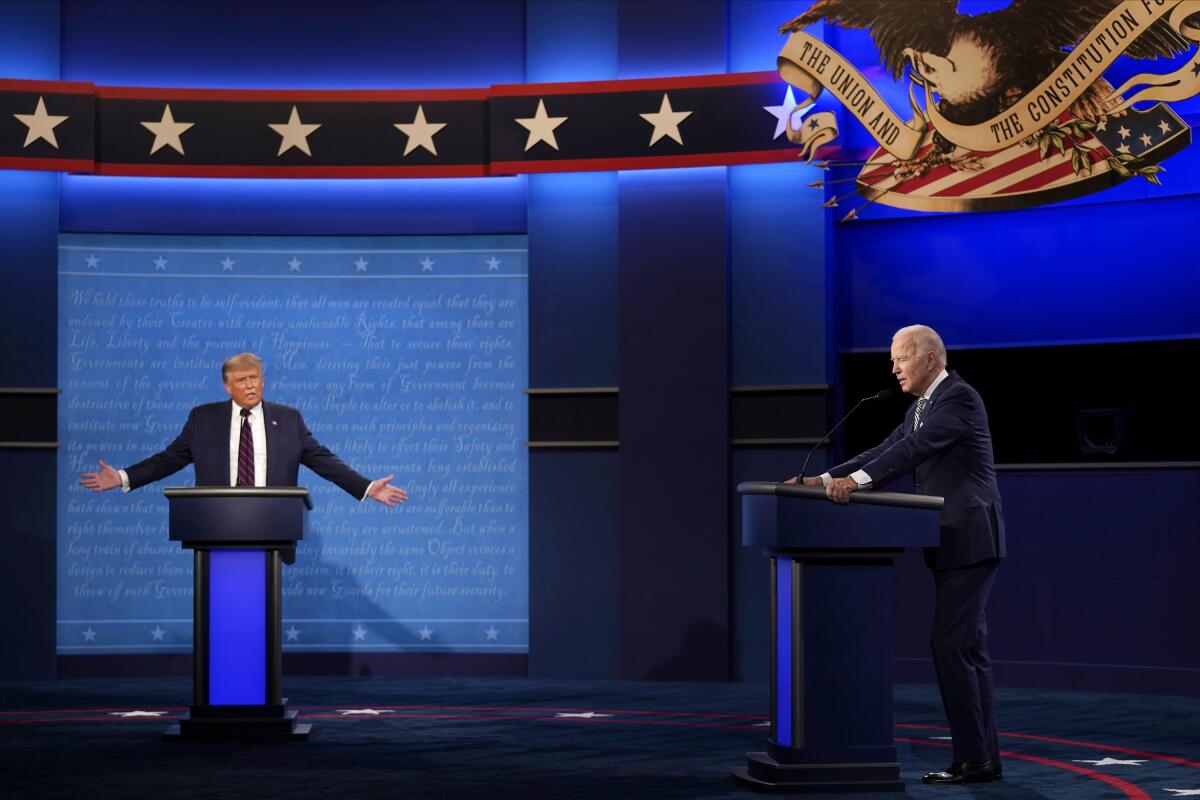
- Share via
President Trump must show that he can no longer infect others with the coronavirus if the second presidential debate is to take place as scheduled next week in Miami, a top advisor to his Democratic challenger, Joe Biden, said Wednesday.
“Look, the obligation is on Donald Trump here to prove that he’s not contagious for that debate,” Kate Bedingfield, Biden’s deputy campaign manager, told CNN.
Bedingfield’s remarks came as medical experts questioned whether Trump, who was hospitalized with COVID-19 from Friday until Monday, could participate without endangering Biden, the moderator and the audience at the town-hall-style debate set for Oct. 15.
Biden expects to participate, Bedingfield said, but “there will be citizens there in attendance asking questions,” so Trump must meet the safety protocols put forth by the Cleveland Clinic for the three presidential debates and Wednesday night’s vice presidential debate.
Based on limited and at times misleading medical information released by the White House, experts said, it’s possible the Republican president might still be contagious next week. There’s also a chance Trump could take a turn for the worse and wind up back in the hospital, they said.
As the coronavirus outbreak at the White House spun further out of control Tuesday, Biden suggested that the Miami debate should be canceled if Trump is still sick.
After a speech Tuesday in Gettysburg, Pa., Biden was asked if he would feel safe onstage with Trump. “I think if he still has COVID, we shouldn’t have a debate,” the former vice president responded.
Whether Trump will still be contagious depends on the severity of his case as defined by the U.S. Centers for Disease Control and Prevention. COVID-19 patients with mild cases can safely end isolation 10 days after the onset of illness, so long as they have been free of symptoms for 24 hours, the CDC says. For severe cases, it is 20 days.
Trump announced early Friday that he’d tested positive for the coronavirus, and he was hospitalized later that day after he showed symptoms of COVID-19.
If it’s 10 days, Trump could come out of isolation this weekend — before the Miami debate. If it’s 20, it would be the week after the debate. Even if doctors clear him to debate, there’s no guarantee he won’t be contagious, especially for a lengthy, heated argument indoors.
“The shouting creates a lot more aerosol, so it makes these droplets finer, so they can linger in the air longer and potentially infect people,” said Peter Chin-Hong, a professor of medicine who specializes in infectious diseases at UC San Francisco.
Chin-Hong and others in his field suspect Trump’s case is severe, based partly on video showing him walking up the South Portico staircase at the White House on Monday upon returning from Walter Reed National Military Medical Center.
“He was using a lot of muscles to breathe, he was short of breath, you can see he was pursing his lips — those are all signs that he continues to have lung involvement and active virus potentially,” he said. Chin-Hong said he would be worried about Trump debating and suggested he wear a mask if he does.
What also makes Trump’s case look serious, experts said, is that he was given oxygen twice and treated with dexamethasone, a steroid normally used just for severe COVID-19 cases.
Trump campaign operatives have claimed victory over the coronavirus for months. Now that the president has COVID-19, how do they reboot?
On Friday, White House officials said Trump had only mild symptoms. But he was hospitalized that evening, and White House Chief of Staff Mark Meadows said Saturday that Trump’s “vitals over the last 24 hours were very concerning.”
Anne Rimoin, a UCLA epidemiology professor, suggested the candidates stay in different locations, as Richard Nixon and John F. Kennedy did in their third presidential debate in 1960. Nixon was in Los Angeles, Kennedy in New York.
She also questioned the trustworthiness of medical information released by a White House that has refused to do full contact tracing to contain its outbreak of a disease that has killed 211,000 Americans.
“This is about understanding possibly one of the largest super-spreading events — and certainly the most high-profile one — in history,” she said. “This is a scandal of epic proportions.”
Neha Nanda, an epidemiologist at USC’s Keck School of Medicine, said the time frame for contagion is not fixed. “It’s very nuanced, and it requires an expert opinion to decide whether the patient is ready to come out of isolation,” she said.
Trump tweeted Tuesday that he was looking forward to the debate. “It will be great!” he said.
As the day wore on, the cluster of infections among people close to Trump continued to grow, with his senior White House advisor Stephen Miller testing positive by day’s end.
Others with the virus include First Lady Melania Trump, presidential advisor Hope Hicks, White House Press Secretary Kayleigh McEnany, four press aides, Trump’s personal assistant Nick Luna, his former senior advisor Kellyanne Conway, Trump campaign manager Bill Stepien and former New Jersey Gov. Chris Christie, who helped Trump prepare for his first debate and is now hospitalized with COVID-19.
More to Read
Get the L.A. Times Politics newsletter
Deeply reported insights into legislation, politics and policy from Sacramento, Washington and beyond. In your inbox twice per week.
You may occasionally receive promotional content from the Los Angeles Times.
